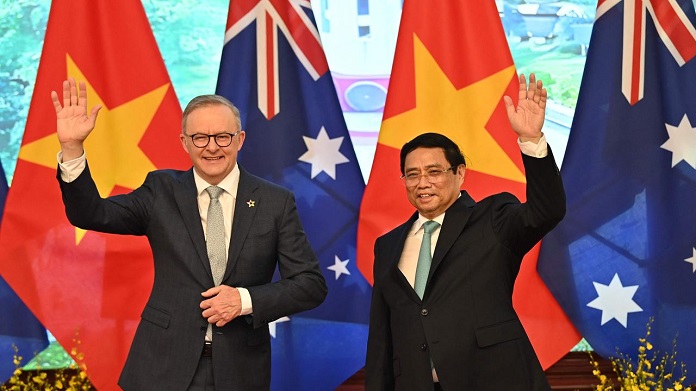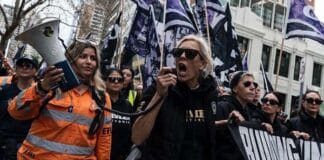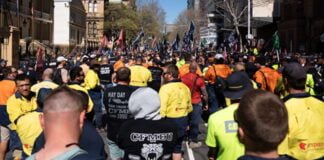Prime Minister Anthony Albanese’s recent visit to Vietnam highlights Australia’s continuing program of strengthening economic and military ties with countries that can be allies against China.
Albanese is trying to finalise a Comprehensive Strategic Partnership with Vietnam by the end of this year. This would “signal the trust we have in each other as top-tier partners and enduring friends”, as if Australia’s role in the war in Vietnam never happened.
It doesn’t matter that Australia’s “friends”, including India under the chauvinist thug, Narendra Modi, trample on democratic rights, so long as they suit Australian strategic interests—corralling and encircling China.
Albanese told ABC’s 7.30 Report after his return from the Shangri-La Dialogue in Singapore, “Our alliance with the United States is one of the three pillars of our foreign policy along with regional engagement and our support for multilateral forums.”
As one of Australia’s new “pillars”, Albanese was happy to flatter the Stalinist Communist Party officials of Vietnam, calling the country “an economic powerhouse”.
He wants to expand Australian trade—worth $22 billion last year—with Vietnam, which says it wants to reduce its economic reliance on China.
ABC News reported that Albanese was “also expected to discuss a host of strategic issues, including China’s militarisation of the South China Sea and the growing tension between Beijing and Washington”.
He met with the General Secretary of the Vietnamese Communist Party, Nguyen Phu Trong, and the Prime Minister, Pham Minh Chinh, in Hanoi.
In case anyone had missed it, Albanese pointed out, “Vietnam, of course, shares a border to its north with China.”
Tense
What Albanese didn’t say was that Vietnam and China went to war for almost a month along that northern border in February 1979, with Vietnam holding its own against China.
Vietnam has current territorial disputes with China over islands in the South China Sea. The ABC reports, “There have been a host of tense confrontations between vessels from both countries in recent months.”
While in Hanoi, Albanese was happy to agree with Vietnam using the international Convention of the Sea to pursue its territorial aims, in order to portray China as the villain of the piece.
But as US Admiral William F. “Bull” Halsey Jr said in August 1946, “Freedom of the seas is one of the oldest policies … of the US. We demand the right to go anywhere anytime. It’s nobody’s damn business where we go. We shall go anywhere we please.”
As a preeminent super power in world affairs after World War Two, the US made sure the international Convention of the Sea reflected those aims.
While Albanese cosies up to the repressive government in Hanoi, ordinary people in Vietnam have been mounting years of small-scale protests against their rulers’ attacks on the right to free speech and peaceful assembly, and the destruction of the environment by polluting industries, ironically some owned by China and Taiwan. Those rights are all supposedly allowed under Vietnamese law.
While the ABC reported Vietnamese clemency, at Albanese’s urging, for two Vietnamese-Australians on death row, more than 160 Vietnamese people remain in jail for peacefully exercising their basic civil and political rights, according to the Asian section of Human Rights Watch.
As Phil Robertson, its deputy Asia director, said, “Vietnam’s international donors and trade partners should speak out against the government’s abusive practices.”
Given Australia’s need for strategic alliance partners, we can expect only deafening silence from Albanese and his Foreign Minister, Penny Wong.
Restrictions
Human Rights Watch published a report in February 2022 that documents “Vietnam’s systemic and pervasive use of restrictions on freedom of movement against political activists and dissidents between 2004 and 2021”.
In 2022 alone, Vietnamese courts convicted at least 35 people for campaigning for human rights, democratic rights and environmental causes.
At least another 167 other people are being held by police in remand—pre-trial detention—on politically-motivated charges.
One of those environmental causes was protests against Formosa Steel, in April 2016, when exceptionally large protests took place across Vietnam after a toxic discharge by the firm “resulted in an estimated 70 tons of dead fish washing ashore along more than 200 kilometres of Vietnam’s central coastline”.
Like Australia, Vietnam is divided by class. In mid-2015, about 17,000 workers at the footwear firm Pou Chen Group staged a three-day strike in Bien Hoa, the capital of Dong Nai province, near Ho Chi Minh city, to resist changes to their work benefits.
Pou Chen workers held a four-day strike again in January 2022, when the Taiwanese-owned firm reneged on paying the workers their Tet (lunar new year) holiday bonus.
Albanese sees a Vietnam led by the Communist Party as a pawn to be used in an imperial game. The workers of Vietnam deserve our help in upending the whole rotten chessboard.
By Tom Orsag






